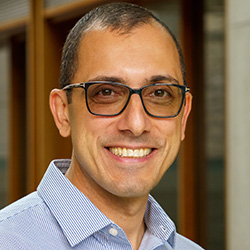The Cross-College Magnetics Center hosts a dynamic seminar series featuring distinguished speakers from academia, industry, and government labs. Our seminars showcase cutting-edge breakthroughs in magnetics research, offering a dynamic platform for networking, discussions, and the cultivation of scientific collaborations.
New Phenomena of Hall Effects in Noncollinear Spin Systems
Speaker: Professor Hua Chen, Colorado State University
Date & Time: 11:00 AM-12:00 PM, July 1, 2025
Location: Dana 114
Abstract
It has now been well established that noncollinear magnetic order enables unconventional mechanisms contributing to different variants of Hall effects, such as the topological Hall effect, the anomalous Hall effect, and the spin Hall effect, etc. In this talk I will mention two new phenomena related to the broadly defined Hall effects in noncollinear spin systems. The first is the different lengths of anomalous Hall vector for distinguishing discrete degeneracies of frustrated spin systems, represented by the recently discovered metallic kagome spin ice compound HoAgGe. We find that energetically degenerate ice-rule states on magnetically induced plateaus of HoAgGe, which are related to each other by transformations involving lattice distortion reversal, can have very different transport properties. The second is a new quantity that we coin as the “Hall mass” that governs the transverse response of spin currents in noncollinear antiferromagnets to longitudinal spatial gradients of the order parameter. We find that the Hall mass generally exists in all noncollinear antiferromagnets, especially in their polycrystals. The Hall mass can lead to transversely flowing spin currents when spins are pumped from a ferromagnet into a noncollinear antiferromagnet, and can also be detected by spectroscopic experiments.
Biography
Hua Chen is an Associate Professor in the Physics Department and School of Materials Science and Engineering at Colorado State University. He did his PhD at the University of Tennessee at Knoxville, then his postdoc at the University of Texas at Austin. In 2017, he joined the faculty of the Physics Department at CSU. His research group is driven by curiosity, and as a theory group, they are especially interested in topics that are closely connected to experiments. Their recent interests involve exploring properties of noncollinear magnetism that are inherently different from collinear ones, uncovering novel topological and transport phenomena enabled by spin-orbit coupling, and studying van der Waals magnets. He received the NSF CAREER award in 2020.
Computing with Magnets: From New Materials to Physics-Inspired Chips
Speaker: Professor Pedram Khalili, Northwestern University
Date & Time: 3:00–4:00 PM, April 16, 2025
Location: Shillman 320
Zoom: Join Seminar
Abstract
The emergence of magnetic random-access memory (MRAM), based on nanoscale magnetic tunnel junctions (MTJs) integrated on silicon CMOS, provides unprecedented opportunities for physics-inspired unconventional computing architectures. This talk reviews the state of ferromagnet-based MRAM, explores advances in electric-field-controlled MTJs and all-antiferromagnetic tunnel junctions, and discusses applications in probabilistic computing and Ising machines using MTJs. Experimental results and future directions for co-designed CMOS+MTJ p-computing circuits will be presented.
References
- [1] Y. Shao and P. Khalili Amiri, Adv. Mater. Technol. 8, 2300676 (2023)
- [2] Y. Shao et al., Communications Materials 3, 87 (2022)
- [3] J. Shi et al., Nature Electronics 3, 92 (2020)
- [4] S. Arpaci et al., Nature Communications 12, 3828 (2021)
- [5] P. Khalili Amiri et al., Annual Review of Materials Research 54, 117 (2024)
- [6] J. Shi et al., Advanced Materials 36, 2312008 (2024)
- [7] Y. Shao et al., Nanotechnology 34, 495203 (2023)
- [8] C. Duffee et al., arXiv:2412.08017 (2024)

Biography
Pedram Khalili is a Professor of Electrical and Computer Engineering and holds the AT&T Research Chair at Northwestern University, where he also serves as Co-Director of the Applied Physics Program. He received his PhD with distinction from Delft University of Technology. Prof. Khalili is a Distinguished Lecturer of the IEEE Nanotechnology Council, serves on the Executive Committee of the IEEE Task Force for Rebooting Computing, and is Co-Chair of the IEEE NTC Technical Committee on Heterogenous Integration and Chiplets. He has received the Northwestern ECE Allen Taflove Best Teacher Award and is a Senior Member of the IEEE.